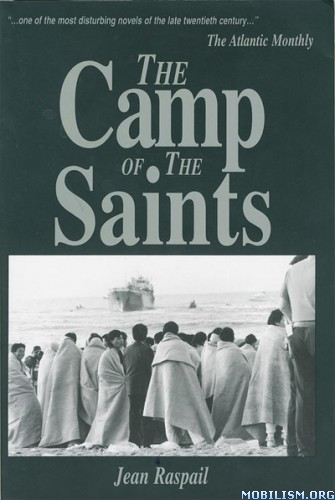
France today:
http://www.youtube.com/embed/A3YQANdvvbY
Some Amazon reviews of Jean Raspail's 1970 prophetic novel Camp of the Saints:
The Prophet as Leper July 31, 2000
By Lloyd A. Conway
This book is so politically incorrect that I admire Amazon.com for actually carrying it. Written in the early 1970s, this book looks beyond the cold war to a North-South confrontation in which European civilization is unilaterally morally disarmed. The thesis is simple: suppose a million starving people from the Ganges actually took Western rhetoric of compassion, explotiation, etc., to heart, and comandeered, en masse, shipping, with the intention of moving to the shores of France? (Raspail, of course, is French.) Would anyone stop them? The imagery employed is interesting. The title comes from Revelation, Chapter 20, and refers to the forces of evil laying seige to the camp of the saints, here meant to be the nations of the West. "The thousand years are over..." is chanted from Third World lips, harking to the millenial reign of Christ, as well as to the millenial domination of Europe over the globe. Raspail has the Vatican, World Council of Churches, and other organs of what he saw as Western liberal compassion try to feed the Armada, as it sails around the Cape. The bodies of their would-be benefactors are cast into the sea. The characters who oppose, with violence, the Armada are named with names like Constantine Drasages and Luke Notaras, namesakes of the last Byzantine Emperor and Admiral. They are portrayed as villans in the media; one of the more thoughtful leftists, fashionably in support of opening up France's shores, but cynical enough to see the potential results, reflects on the parallels between Byzantium's fate and that of the West. The author's point is that any who dare to say that 'white' civilization has a right to exist are branded racists and cast out of the pale of polite society. The narrative is set up as a flashback. Read more ›
---
A Courageous and Prophetic Polemic of a Novel August 7, 2002
By Jamie MacTavish
Jean Raspail was already a distinguished travel writer and novelist when he put his reputation on the line with this one - He had a lot to lose. To his credit, Raspail pulls no punches and manages to say just about everything there is to say about the threat that Third World immigration poses to Western Civilization.
I had heard about this book, but decided to read it for the first time only after boat loads of Kurds landed on France's Mediterranean beaches a couple of years ago. The sight of hundreds of ragged Kurds running through the streets of Cannes could have been a scene from the film version of this novel.
The story is about an invasion of France by boat loads of East Indians, and the small group of Frenchman who defend against them. But as Raspail notes in the Introduction, the story is a parable - A parable of the destructive Third World immigration in the West that has been going on since the latter part of the 20th Century, and the West's lack of will to resist it.
Immigration negatively impacts the environment, the economy, crime, and national security. This novel posits that it further threatens to destroy the relatively democratic, tolerant and civilized cultures of the West and the essential commonalities of the Western peoples. According to Raspail, the West "has no soul left" and "it is always the soul that wins the decisive battles."
To call the novel "racist" is unfair. Raspail includes an East Indian among the "Saints" who defend France, and portrays many White Frenchmen who welcome the invaders as their equals. The novel clearly states that being a Westerner is NOT a matter of race, but a "state of mind."
---
Most Important Literary Work This Century August 1, 1999
By Cleve Blakemore
In simple prose and shockingly honest frank descriptions of his characters, Jean Raspail travels in the company of writers as great as Dostoyevsky and Chekov concerning a subject matter so sensitive it is forbidden to even discuss in public today. I feel the book makes an eloquent case for a conclusion so obvious that few of us can afford to ignore it like the Emperor's Clothes for much longer : given differentials in birth rates and immigration, the complete elimination of whites as a race is inevitable within a single century from now. Reading the book will make you understand why white people are treated as different by all the other races of the world and why they are considered as too dangerous to be permitted to develop the same racial cohesion and consciousness that is taken for granted by everyone else. Forget about political correctness ... this book will curl your toes inside of the first three chapters with startling insights and you'll recognize a lot of the personalities caricatured in the book in both the mainstream media and in the entertainment industries. At the turn of the century, white people were a mere 22% of the world population. Today, they are 8% and rapidly declining. For those interested in protecting endangered species, look no further than this astonishing literary classic, excellently translated from the original french by Norman Shapiro. If you read one book this year, make it "The Camp of the Saints."
---
Chillingly Depressing -- It Is Coming to Pass June 16, 2004
By A Customer
This book is disturbing in the extreme. This is mainly due to the fact that most of the predictions Raspail made back in 1973 are now coming true. Consider that he told us that in 20 years, Arabs would be 30% of France's population -- look at today's demographics and you'll see that it has come to pass just as he predicted.
To those nay-sayers and biological flat-earthers who denigrate this book because of what they perceive to be Raspail's prejudices coming through in the characters, I must say this:
It is not necessarily that Raspail is letting his own prejudices come through in the characters, it is that Raspail is allowing the characters to exhibit the TRUE feelings of most Westerners when they consider the prospect of the imminent Third World invasion. People ascribe these views to Raspail himself simply because, since it's not possible for White people to speak openly about their feelings in this day and age, such views are never brought up in "polite company."
Don't fool yourself into thinking that this book is not an accurate portrayal of the White man's struggle against envy and hatred, for it most surely is.
---





